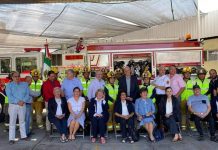This week, the Oaxaca Times sat down to talk with John Benjamin, a dean’s fellow at the Massachusetts Institute of Technology’s Sloan School of Management and American commentator on economics and politics. His work has been featured in a number of publications, most recently The New Republic; “Business Class,”an essay he published this spring on the politics of business education, has been widely circulated among the international business community.
John is currently working in Oaxaca for the summer and living in a shared casita across from Parque Llano. But his daily occupation takes him further afield. Most mornings, he heads out by motorbike or bus to the pueblos in the foothills of the Sierra Juárez mountains, where he visits indigenous artisans and helps administer interest-free loans to them as part of Oaxaca’s Fundación En Vía. John, who grew up in Houston, Texas and now lives in New York City, says, “Even though I tend to stick out in the mountain communities, the people there treat me like one of their own.”
During a long conversation in our courtyard on Sunday, John and publisher Yolanda García Caballero discussed politics between the United States and Mexico, common issues with international nonprofit work, and his impressions as an American about life in Oaxaca.
Below is a part of the conversation, which was conducted in English and Spanish. It has been edited for clarity.
Question One
Oaxaca Times (OT): You are spending the summer working for Fundación En Vía here in Oaxaca. Can you tell us what the group does and why you wanted to work here?
John Benjamin (JB): The Fundación uses money raised through responsible tourism to sponsor interest-free loans and education for entrepreneurial women in the five pueblos of the Tlacolula Valley. “Responsible tourism” is just a way of describing any tourist activity – for us, it’s guided visits to the villages – that doesn’t exploit people in a host community. The goal of the organization is to empower these women to support themselves and ultimately their families.
I wanted to work with the Fundación for three reasons. First, it relates to my interest in business, particularly the question of how we can build organizations in which the needs of employees and customers, like the artisans and tourists in this case, are aligned as squarely as possible. Second, my role with the Fundación lets me get out of the office here in the city. Most days I travel alone or with a small team to the valleys, where we work directly with the entrepreneurs and artisans who receive loans. Finally, I knew I wanted to be here in Oaxaca. It’s a city that seemed creative, historical, with great bars and restaurants, and a big expat community. It hasn’t disappointed.
Question Two
OT: We’ve talked about issues with international nonprofits. What’s one piece of advice you would give aspiring volunteers?
JB: I think it’s a good idea to be wary of slick marketing. The organizations offering experiences that might appeal to people in industrialized countries aren’t necessarily attuned to what’s needed on the ground – or their leaders might be wasting resources and even skimming off the top. To find an opportunity, I relied on my friend Willy Oppenheim’s organization Omprakash, which places would-be volunteers in ethical nonprofits around the world, because I knew he and his team would do the vetting I couldn’t do. It features a lot of nonprofit partnerships across Mexico.
Question Three
OT: After spending some more time in Mexico, what do you think is a common misconception about US-Mexico relations?
JB: That the relationship between our two countries is somehow zero-sum. In other words, that if you tear down your neighbor, you’ll win something for your people in return, or that our leaders can tantrum the way to shared prosperity and peace.
This goes beyond trade, which is obviously critical. So many Americans I know have a grandfather, an aunt, a college friend who has spent time in Mexico or lives here now. And similarly, countless Oaxaqueños I’ve met are quick to tell me, “My sister goes to school in California,” or “My brother works in New Jersey.”
Our President lashes out at Mexico, but the last president from his party [George W. Bush] has a Mexican sister-in-law. The previous Republican nominee’s [Mitt Romney’s] dad was born in Chihuahua. Our people, our economies – they share enough and even blend together in places, to the point that hurting the other nation is a good way to hamstring your own people and economy. The Mexican-American bond should be one of the strongest globally and a bulwark against competition outside the Western Hemisphere.
Question Four
OT: What is something about life in Oaxaca that has surprised you?
JB: The inclusiveness of social life, especially among people of different generations and social classes. I like that families seem to stick together here. You see multiple generations having a good time, a lot of grandparents with grandkids, if you walk through the zocalo at night. Public traditions like Guelaguetza [an annual Oaxaca festival held in late July] encourage participation and a sense of ownership and belonging from different levels of society. In the States, social life can seem more segregated by economic class and age. We have a lot to learn from you about that.
Question Five
OT: What’s your perfect day in Oaxaca?
JB: Still searching for the answer to that one. Hike the Etla Valley then geek out at the ruins of Monte Alban. You can’t go wrong starting your night with tlayudas from Esther at El Escapulario, then a mezcal or three at Los Danzantes after that.



![John Benjamin [Image courtesy of C.O.S.]](https://www.oaxacatimes.com/wp-content/uploads/2018/07/unnamed-696x498.jpg)




![Five Questions for John Benjamin [Image courtesy of C.O.S.]](https://www.oaxacatimes.com/wp-content/uploads/2018/07/unnamed-100x70.jpg)
